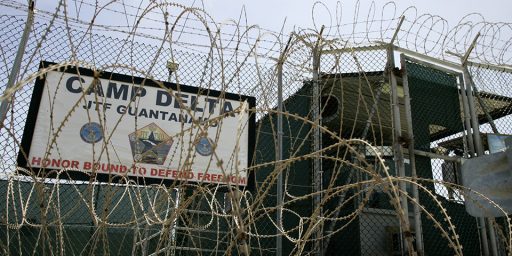Military Prisoner Distinctions
Miami Herald: Military: Guantanamo Unlike Iraq
Interrogation techniques used at the Guantanamo Bay terror prison are meant to wear down detainees, but the rules forbid the kind of tortures coming to light in Iraq, say U.S. government officials and other experts familiar with the facility.
Guantanamo’s techniques are designed to cause ”disorientation, fatigue and stress,” said one government official. But there is no stripping detainees naked, as was practice at the Abu Ghraib prison outside Baghdad.
Approved techniques include sleep disruption and deprivation, bright lights and loud music, and at times keeping detainees in uncomfortable positions, said a Bush administration official involved in decisions about the Guantanamo facility.
The measures aim to put pressure on detainees’ ”pride and ego” — but not to abuse them to the point of ridicule, in contrast to reports and photos from the Iraq facility. The thinking is that severely abusive tactics are counterproductive to gaining intelligence information.
Army Col. David McWilliams, a spokesman for the Miami-based Southern Command, which runs Guantánamo, said the facility permits “no physical contact at all. . . . Our procedures prohibit us from disrobing a prisoner for any reason at all.”
The Bush official said that more extreme methods — such as near daylong interrogations — must be approved by senior officials, including those at Southcom. They also require medical monitoring.
***
The International Committee of the Red Cross, which has had access to Guantanamo since the prison camp opened, does not comment publicly on detention conditions. But in October, after 32 suicide attempts at the camp, it cited the ”deterioration in the psychological health of a large number” of prisoners.
But interviews of five former Guantanamo Bay detainees by Amnesty International last year revealed no stripping or humiliation and no physical abuse at Camp Delta itself.
This makes the Iraq abuses even harder to understand. The prisoners at Gitmo are not entitled to the protections accorded soldiers under the Geneva Convention. Under Article IV, Section B, nontraditional armed forces are given EPW protection provided they meet several tests:
[a] That of being commanded by a person responsible for his subordinates;
[b] That of having a fixed distinctive sign recognizable at a distance;
[c] That of carrying arms openly;
[d] That of conducting their operations in accordance with the laws and customs of war.
None of the Gitmo detainees meet that test, which has remained unchanged since at least the Hague Conventions of 1899. Persons who become combatants by taking up arms by who aren’t members of an organized armed force, don’t wear easily identifiable clothing and insignia to distinguish them from noncombatants, or who otherwise flout the law of war (e.g., by using a protected facility such as a mosque for combat operations) are unprivileged belligerents or unlawful combatants (the terms are interchangable; the former term was the only one I’d seen in the literature until very recently). For example, American special forces or intelligence soldiers who don civilian garb in a combat zone for the purposes of blending in with the civilian population lose their protection as POWs.
The detainees in Iraq captured during the first phase of the war, who were fighting under the auspices of the regime and wearing the uniform of the Iraqi army, are lawful combatants and therefore entitled to protection as EPWs. So would insurgents if they met the tests above, which few of them do. (This is, by the way, in sharp contrast to the 1991 Gulf War, when all Iraqis captured were clearly EPWs under the Convention.) It is inconceivable why the unlawful combatants at Gitmo would be accorded humane treatment and not those in Iraq if it were official, even if tacit, government policy at work.
While the distinction between lawful and unlawful combatants is important for a variety of reasons, we are still under an obligation to provide basic human rights protections to all detainees. Even the least protected class of unprivileged belligerents, those caught as spies, are entitled to basic due process and freedom from torture, although the exact level of protection to which they’re entitled is hotly disputed. Much of the literature cited by the ICRC and other activist groups are unratified “draft” conventions–proposals that were floated at various times but upon which no consensus was reached.
Update: The Taguba hearings from this afternoon provide an excellent overview of the distinctions being made in practice at Gitmo versus (at least theoretically) Iraq.




